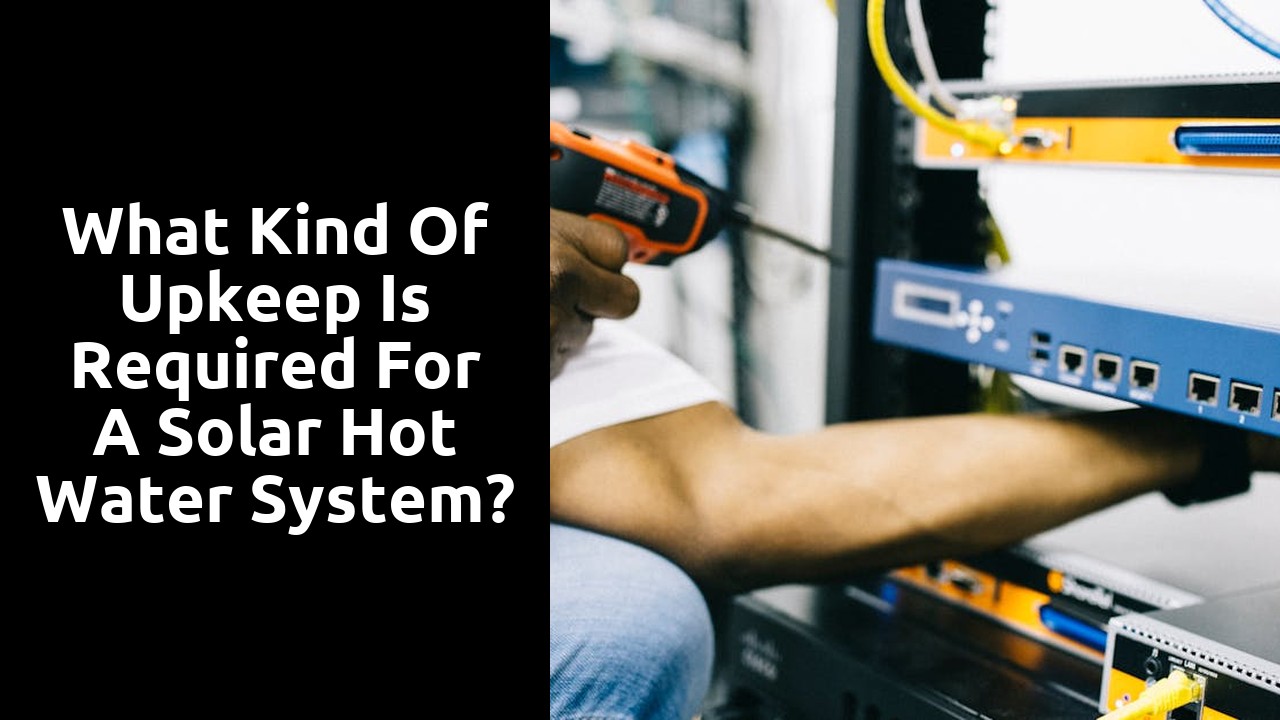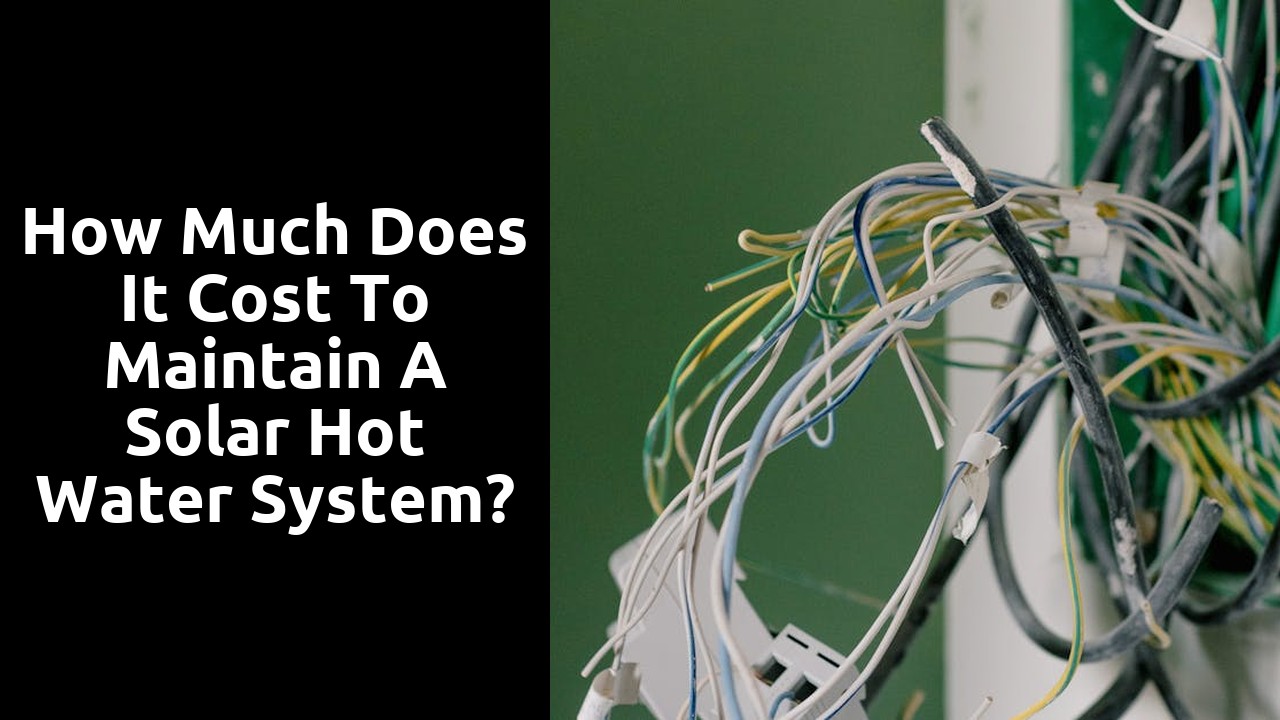
Table Of Contents
Flushing the System
Flushing the system is an essential task when it comes to Solar Hot Water System Maintenance and Repair. Over time, sediment and mineral build-up can accumulate inside the system, causing inefficiency and potential damage. Flushing the system involves draining out the existing water and refilling it, which helps get rid of any debris that might have settled at the bottom of the tank or within the pipes.
Regularly flushing the system not only ensures the smooth operation of your solar hot water system but also extends its lifespan. It is recommended to flush the system at least once a year to prevent any blockages and maintain optimal performance. By taking the time to flush your solar hot water system, you can keep it working efficiently and avoid costly repairs down the track.
Removing Sediment BuildUp Regularly
To maintain optimal performance and extend the lifespan of your solar hot water system, regular removal of sediment build-up is crucial. Sediment, such as dirt and mineral deposits, can accumulate in the system over time, impeding its efficiency. It is recommended to flush the system periodically to get rid of these deposits and ensure smooth operation. Neglecting this maintenance task can lead to reduced heat transfer and increased energy consumption, leading to higher utility bills.
When removing sediment build-up from your solar hot water system, it is essential to follow the manufacturer's guidelines and use appropriate flushing techniques. This process typically involves draining the system, flushing it with water to dislodge the sediment, and then refilling and repressurizing it. By incorporating regular sediment removal into your maintenance routine, you can prevent blockages and maintain the system's performance. Remember, proactive maintenance is key to the longevity and efficiency of your Solar Hot Water System Maintenance and Repair.
Checking Anode Rod
The anode rod in a solar hot water system plays a crucial role in protecting the tank from corrosion. To ensure the system functions efficiently, the anode rod should be checked regularly for signs of wear and deterioration. By inspecting the anode rod, you can prolong the lifespan of your solar hot water system and prevent unnecessary repairs. As part of Solar Hot Water System Maintenance and Repair, experts recommend checking the anode rod annually and replacing it if it is more than 50% depleted.
In addition to visual inspection, the anode rod's condition can be tested using a multimeter to measure its resistance. A healthy anode rod should have low resistance, indicating that it is still effectively protecting the tank. If the resistance is high, it is a sign that the anode rod is depleted and needs to be replaced promptly. Prioritising the regular checking and maintenance of the anode rod ensures the longevity and efficiency of your solar hot water system, ultimately saving you time and money in the long run.
Inspecting and Replacing When Necessary
Inspecting and replacing the anode rod in your solar hot water system is crucial for ensuring its optimal performance and longevity. Over time, the anode rod can deteriorate due to the corrosive elements in the water, potentially leaving your system vulnerable to damage. Regular inspection allows you to identify any signs of wear and corrosion on the rod, indicating the need for a replacement. By promptly replacing the anode rod when necessary, you can protect your system from corrosion and extend its lifespan, ultimately saving you from costly repairs in the future.
When it comes to inspecting and replacing the anode rod in your solar hot water system, it is recommended to consult the manufacturer's guidelines for specific instructions. Generally, this maintenance task should be carried out at least once a year to ensure the continued efficiency of your system. Keep in mind that proactive maintenance plays a crucial role in preventing major issues with your solar hot water system down the track. By staying on top of the necessary inspections and replacements, you can enjoy a reliable and efficient system for years to come. Solar Hot Water System Maintenance and Repair.
Monitoring Energy Consumption
Monitoring energy consumption is a crucial aspect of maintaining the efficiency of a solar hot water system. By keeping a close eye on the energy usage patterns, you can identify any irregularities or spikes in consumption that could indicate an underlying issue. Regularly checking the energy consumption also helps in ensuring that the system is operating optimally and that no energy is being unnecessarily wasted. This proactive approach to monitoring energy usage is key to maximising the lifespan and performance of your solar hot water system.
As part of Solar Hot Water System Maintenance and Repair, it is recommended to record and track the energy consumption data on a regular basis. This information can provide valuable insights into the overall health of the system and help in detecting any potential problems early on. By monitoring energy usage closely, you can take timely action to address any inefficiencies or malfunctions, ensuring that your solar hot water system continues to function effectively and efficiently.
Identifying and Addressing High Usage Patterns
Identifying and addressing high usage patterns is crucial in maintaining the efficiency and longevity of your solar hot water system. Keeping an eye on unusual spikes in energy consumption can indicate potential issues within the system. If you notice a significant increase in your energy usage without a corresponding change in your household's hot water needs, it may be a sign that your solar hot water system requires attention.
Regularly monitoring your energy consumption can help you pinpoint any abnormalities early on and prevent potential damage to your solar hot water system. Consulting with a professional for a thorough inspection can reveal underlying problems that might be causing the increased usage. By being proactive in identifying and addressing high usage patterns, you can ensure that your solar hot water system remains in optimal working condition for years to come. Solar Hot Water System Maintenance and Repair.
FAQS
How often should I flush my solar hot water system?
It is recommended to flush your solar hot water system at least once a year to remove any sediment build-up and ensure optimal performance.
How can I remove sediment build-up from my solar hot water system?
To remove sediment build-up, you can use a flushing kit to flush out the system and clean the tank. Regularly removing sediment will help maintain the efficiency of your solar hot water system.
When should I check the anode rod in my solar hot water system?
It is advisable to check the anode rod in your solar hot water system every 3-5 years to ensure it is in good condition. The anode rod helps prevent corrosion within the tank.
How do I inspect and replace the anode rod in my solar hot water system?
To inspect the anode rod, simply remove it from the tank and check for signs of corrosion or wear. If necessary, replace the anode rod with a new one to continue protecting your system from rust and damage.
Why is it important to monitor the energy consumption of my solar hot water system?
Monitoring the energy consumption of your solar hot water system can help you identify any irregularities or high usage patterns. This information can assist in troubleshooting issues and ensuring the system operates efficiently.
